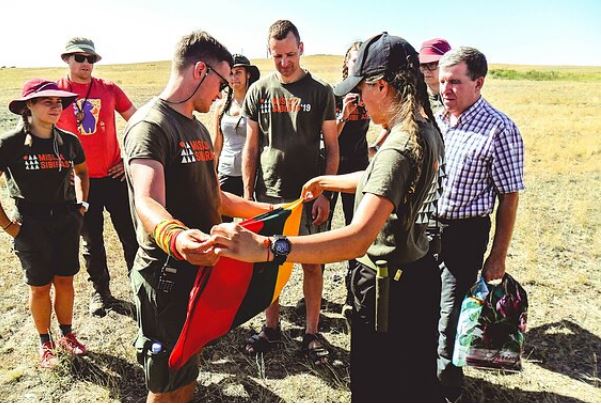
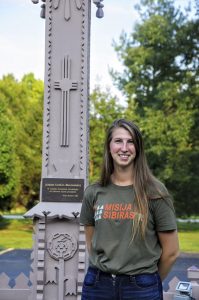 In 2019, Marija Čyvas and 14 other Lithuanian youths traveled to the remotest corners of Kazakhstan as part of the Mission Siberia initiative to find and restore the gravesites of Lithuanians who had been deported from their homeland during the Second World War. Now, almost a year later, she is conducting a speaking tour of Lithuanian communities around the world, sharing her experiences and inspiring all those who come out to listen. “Tėviškės žiburiai” was able to sit down with Marija while she was in Toronto to talk more about her once-in-a-lifetime experience.
In 2019, Marija Čyvas and 14 other Lithuanian youths traveled to the remotest corners of Kazakhstan as part of the Mission Siberia initiative to find and restore the gravesites of Lithuanians who had been deported from their homeland during the Second World War. Now, almost a year later, she is conducting a speaking tour of Lithuanian communities around the world, sharing her experiences and inspiring all those who come out to listen. “Tėviškės žiburiai” was able to sit down with Marija while she was in Toronto to talk more about her once-in-a-lifetime experience.
Could you tell our readers a little more about yourself?
My name is Marija Čyvas and I was born and raised in Chicago. All four of my grandparents fled Lithuania in fear of being deported and were some of the many people who went through the German displaced persons camps before emigrating to the U.S., making me a third-generation Lithuanian American. I graduated in 2019 from the College of Wooster, a small liberal arts school in Ohio, where I double-majored in sociology and Russian studies. I’ve always been active in the Lithuanian community for many years with Catholic youth group “Ateitininkai” and going to all the camps, singing in all the choirs, as well as doing Lithuanian folk-dancing. And then, of course, last summer I participated in the Mission Siberia project; in the 15 years this project has been active, I’m only the third American to participate (the first American participated in 2006; the second in 2018).
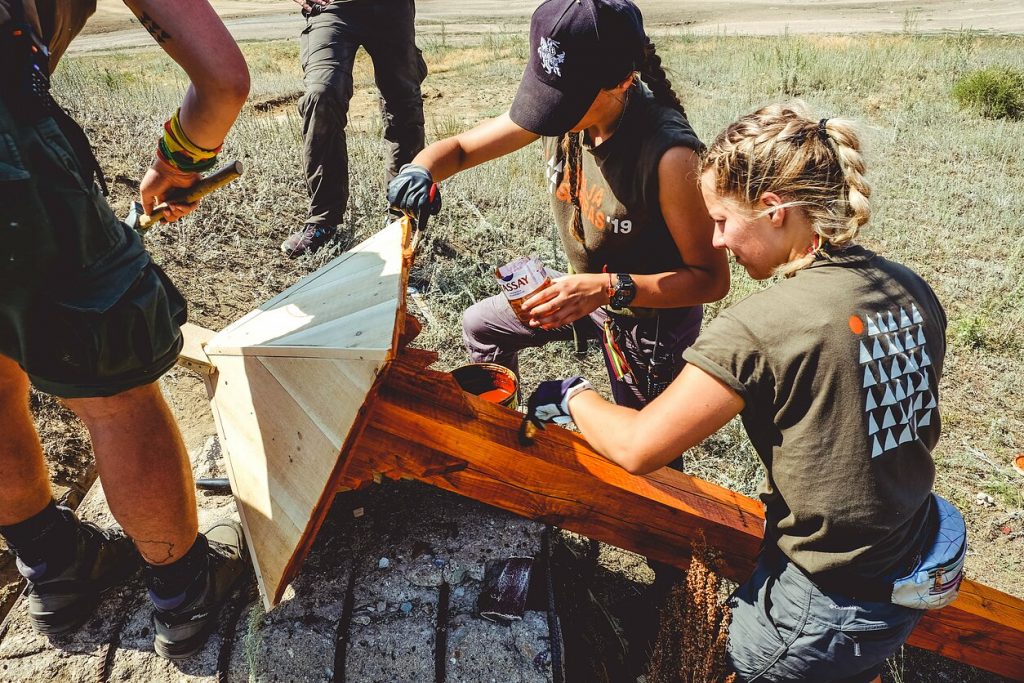
How did you come to learn about Mission Siberia? What is the selection process like to be chosen for the expedition?
I first found out about Mission Siberia through Facebook two years ago. When I messaged my friend from Lithuania to ask her what more she knew, she told me everyone knows about it over there, as it’s currently the most successful youth initiative in Lithuania. She explained that, of about 1,000 people who apply every year, 80 of them are invited to do a trial hike, where they get to know one another and learn how to make traditional Lithuanian crosses. This made me ask myself, Well, how am I supposed to do this trial hike? I can’t just fly there for two days, as it’s so expensive and I don’t have the time to do it. So, at the time, I pushed it aside.
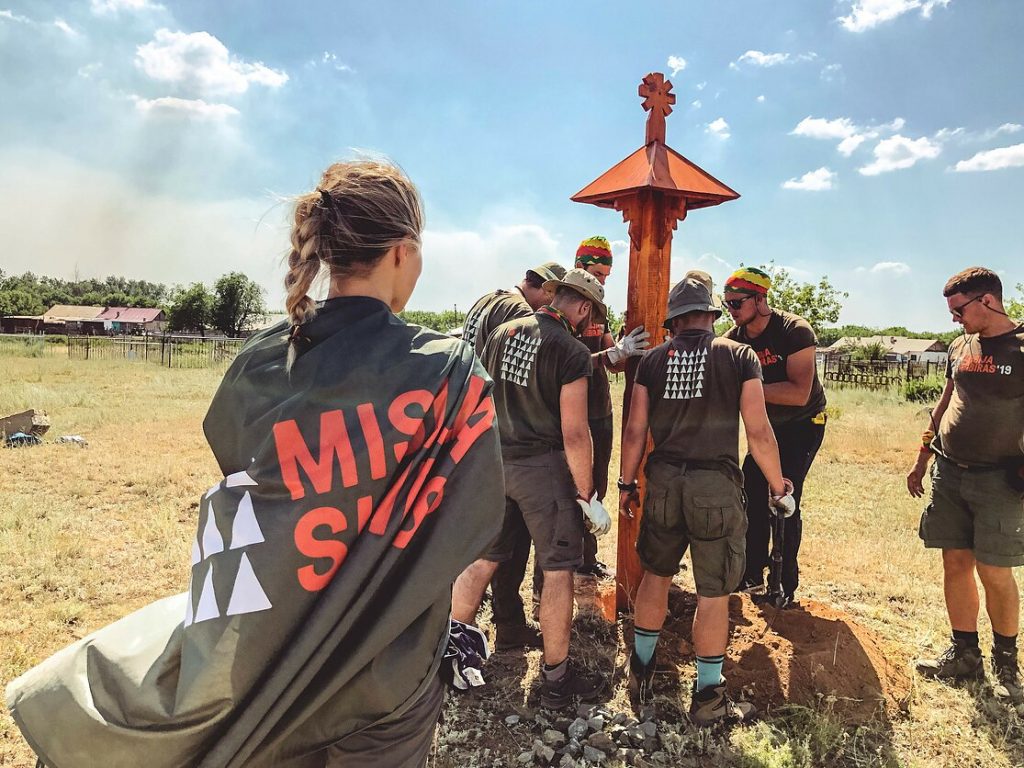
Then, in 2019, several family members and friends from Lithuania wrote to me in one week and encouraged me to finally do it, and so I read up on it again and learned that, at its core, it’s all about the preservation of history and passing it on to the younger generation, which is something I totally stand for. And so, I decided to apply and found out that I didn’t have to participate in that trial hike after all because they understood how hard it was for me financially and timewise. Instead, I had an interview process with the project’s main organizer over Skype, during which she asked about myself, my goals, my family history, and so on. I ended up finding out I’d made the team on my birthday, at 3:00 in the morning. My phone was going crazy, and when I saw that people from Lithuania were writing to me, I knew right way what must have happened!
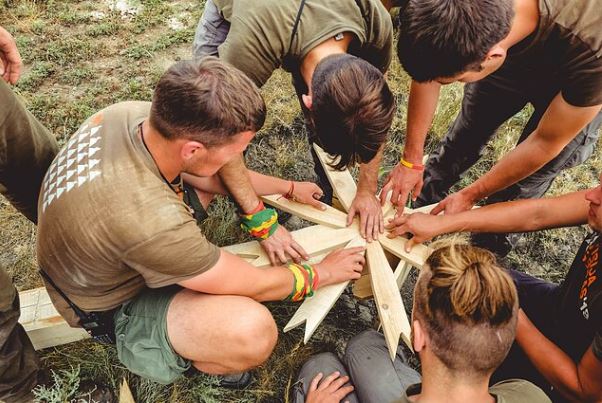
What were some of the physical and mental preparations you underwent before the expedition?
When I found out I had made the team, I had only a few weeks to prepare, so the first thing I did was read a few books about the history of the deportations, like Aleksandr Solzhenitsyn’s The Gulag Archipelago and Anne Applebaum’s Gulag. While I used the gym to stay in shape, we were all fine in that area, as the expedition wasn’t very difficult physically. We were not hiking to gain elevation or for distance. Even though we had backpacks on us, much of the work involved sifting through cemeteries, so we weren’t covering major ground every day.
Just before the trip, the organizers sent a detailed packing list which told us what we needed to bring, so I had to buy things like a backpack, hiking boots, sleeping bag and pad, headlamp, flashlight, safety pins, bungee cords, ropes, waterproof matches to start our fires and make food, and other specific things that took me a while to get. And then once I got to Lithuania a few weeks before the expedition, another part of our preparation involved meeting with Lithuanian political prisoners and deportees who’d survived those years and returned. I was able to meet with two people – my dad’s cousin and a political prisoner who was also a published author – and they showed me pictures, used a map to point out where they were, and explained how things went for them. One of them talked nonstop for three hours!
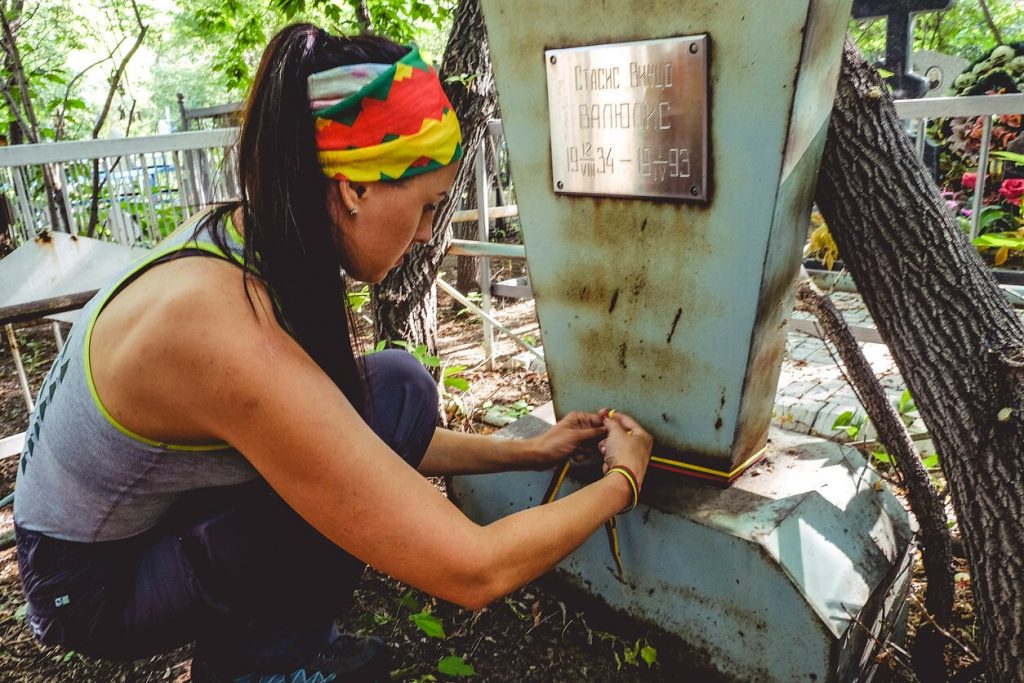
What was it like spending all that time with people who had otherwise been strangers to you before? How did your relationships grow and strengthen during the trip, and do you keep in touch even now?
My biggest fear before the expedition was interacting with the team and what that would be like – whether they would even like me, or whether there would be significant language barriers. When I finally met them, however, it was clear to me right away that I was worried for no reason. I fell in love with them instantly. And when you think about it, 15 people out of 1,000 applicants amounts to the top 1%, so I really had nothing to fear, being among the best of the best. They are everyday people, but they are all motivated and care about this history, so I quickly fit in with them, and we still talk on social media today. Honestly, the team (and the relationships we formed) was the best part of the experience. And, of course, since you’re sleeping in tents together, making food over a fire together, and generally being on top of each other for 10 days, how do you not become close?
I remember when, during our last night together sitting and talking around the fire, one girl suddenly began crying and remarked how weird it was that we were so close already, despite only having just met. I completely felt that and find that it’s so cool that I now have all these really close friends there that I still keep in touch with.
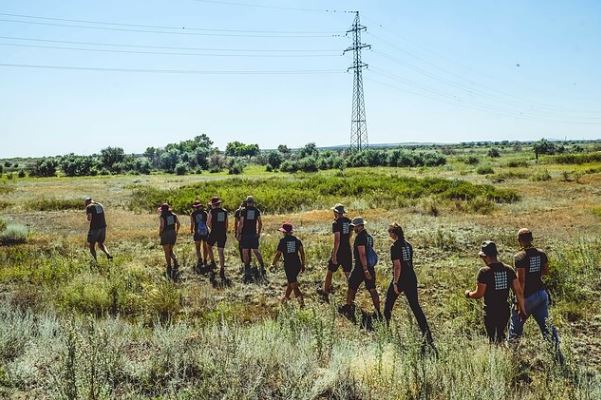
Could you describe some of the emotional aspects of your experience? What really touched you the most?
The most emotional moment for me was when we built the last of our koplytstulpiai (column shrines) and brought a cross that we’d already assembled to our final destination in Kazakhstan. Every time we built one of them, we would stand in a semicircle and keep a moment of silence before singing the Lithuanian anthem. When this final moment came, towards the end, I couldn’t sing a single word of the anthem because I was sobbing! I realized how cool it was that I’m a third-generation Lithuanian American, far from home, with all these Lithuanian team members, doing something that is not only serving this country, but also these people and their legacies. How cool it was that, no matter where you may be as a Lithuanian in the world, you can still serve a purpose to your homeland.
Another cool moment I remember was when I found one of my first Lithuanian graves early in the expedition. I ended up staying there for the next three hours, cleaning it up on my own and repainting the fence. And while I was repainting the fence, a dragonfly came and rested on one of the spokes. When I got close to it, it simply moved over to the next spoke, and it ended up staying with me for the whole three hours! Of course, you don’t know the person whose grave you’re cleaning up, other than that they’re Lithuanian, but just knowing that is enough to make you feel connected in that moment and give you a deep sense of peace.
What are your hopes for sharing your experiences with other Lithuanians around the world? What would you like them to take away from your stories?
One thing I hope our audiences will do after our presentations is go home and find out more about their own family’s history. Whatever their roots may be, I hope they can record it in some way. You don’t need to go to Kazakhstan to preserve this history like we did. Learning your own history is a good alternative – and not just learning it, but teaching it to younger generations, too. I also hope Lithuanian citizens will take the time to learn about the histories of Lithuanians living in the diaspora – Lithuanians in America, Canada, Australia, and so on. Lithuania is not just a place: it’s a people. If we want to keep our culture and ties alive, we’ve all got to know more about the Lithuanian communities beyond us.

Another benefit of doing these presentations is meeting with all the young people and talking to them about why this history is important to them – and not only that, but why they show up to these events in the first place. I believe that our generation needs to step up and carry this history forward. For much of our lives, we’ve been consumers of our respective Lithuanian communities – we go to camps as children, for instance, only to have fun and take everything in. But at some point, we’ve got to become producers by passing these traditions on. We have to be mindful when teaching the younger generations about these things and explain why they’re important and how valuable traditions should continue. It’s not enough to simply show up at these events occasionally. When you have money, start giving to your local parish. When you have kids, start sending them to Saturday school. Whatever your talents are in your community, figure out a way to fit in! Everyone has a role to play, and we all must make our unique contribution if we want our traditions to keep flourishing.
Thank you for sitting down with us, Marija! We are grateful for your hard work and wish you all the best for the future!
Interview conducted by Tomas Trussow



























